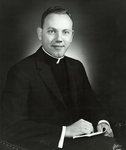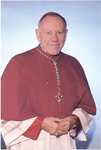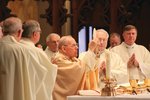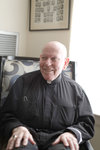



As the Diocese of Providence celebrates its 150th anniversary through June 26, 2022, Rhode Island Catholic is featuring profiles of the men who have served as diocesan shepherds through its history.
After Bishop Russell J. McVinney died in August 1971, Msgr. Daniel P. Reilly, chancellor of the diocese, served as administrator for the next four months while the process of selecting a new bishop was underway.
In December, the Vatican announced the selection of Msgr. Louis E. Gelineau, vicar general of the Diocese of Burlington, Vermont, to serve as the sixth Bishop of Providence.
Bishop Gelineau was born on May 3, 1928, in Burlington, Vermont, the son of Leon G. and Juliette Baribault Gelineau. He was educated at St. Joseph’s Elementary School and then Cathedral High School in Burlington. He studied for the priesthood at St. Paul’s University in Ottawa, Canada, and was ordained to the priesthood on June 5, 1954.
Following his ordination, he served as assistant pastor for two years at All Saints Parish in Richford, Vermont, and one year at St. Stephen Parish, in Winooski, Vermont. He then entered the Catholic University of America, obtaining a degree in Canon Law in 1959.
When he returned to the Diocese of Burlington, he was named assistant chancellor, diocesan director of the Society for the Propagation of the Faith and assistant chaplain at De Goesbriand Memorial Hospital in Burlington.
He became chancellor of the Burlington Diocese in 1961 and was named a papal chamberlain with the title of monsignor by Pope Paul VI. In 1968, he was named vicar general of the Diocese of Burlington and a Prelate of His Holiness.
On December 6, 1971, he was appointed to serve as Bishop of Providence.
“When I was called to go by my bishop, I said ‘I’m not going to Rhode Island,’” he laughed, telling Rhode Island Catholic in a January 2022 interview — on the occasion of his 50th anniversary of episcopal consecration — how much he had loved his native Vermont and couldn’t see himself moving away and serving the Church elsewhere.
But after Burlington Bishop Robert Francis Joyce told him his appointment had been made by Pope Paul VI and that he needed to honor it, he prepared himself to come to Providence.
“That first day I was here I realized that I was supposed to come here. I really felt that was what God was doing for me and asking of me,” Bishop Gelineau said.
It was Bishop Joyce who consecrated him in the Cathedral of SS. Peter and Paul on Jan. 26, 1972.
The new shepherd was received warmly in the Diocese of Providence, where he emphasized the pastoral dimension of his office and especially enjoyed traveling throughout the diocese to meet his flock. His schedule was filled with meetings, parish celebrations, anniversary dinners, special liturgies and confirmations. He also often visited the sick in hospitals and nursing homes.
Early in his administration he created the vicariate structure — still employed today — which organized the day-to-day operations of the burgeoning diocesan ministries under the leadership of vicars who report to the bishop on business in their areas of responsibility.
Seeking to continue the reshaping of the administrative structure of the diocese begun under Bishop McVinney, Bishop Gelineau established a productive relationship with the Priests’ Senate, which his predecessor had formed in 1967 to advise and assist the bishop. In a later effort to streamline administrative structures, a Diocesan Council of Priests replaced the Priests’ Senate in 1978. The Council reached its decisions by consensus, rather than by majority vote.
In April 1972, Bishop Gelineau appointed Msgr. Daniel P. Reilly as vicar general of the diocese, making him the first full time vicar general with an office in the Diocesan Office Building. As vicar general, Msgr. Reilly exercised ordinary jurisdiction in the bishop’s name and represented him in spiritual and temporal matters.
In 1973, a year after his ordination, Bishop Gelineau established in the Diocese of Providence a permanent diaconate program. Three years later, he ordained the first permanent deacons to serve as assistants to the bishop, as well as chaplains to state institutions and nursing homes.
In August 1974, the Vatican granted Bishop Gelineau’s request for an auxiliary bishop. Msgr. Kenneth A. Angell, who then served as diocesan chancellor, was chosen for the office. At the same time, Bishop Gelineau appointed him to serve as vicar general in the office of Msgr. Reilly, who was named Bishop of Norwich, Connecticut, in June 1975.
Bishop Angell enjoyed a good working relationship and close friendship with Bishop Gelineau. On October 6, 1992, Bishop Angell was appointed Bishop of Burlington, Vermont.
In his first two years, in the spirit of the Second Vatican Council, Bishop Gelineau appointed a number of episcopal vicars who exercised the bishop’s authority in administering their areas of oversight in the diocese.
Bishop Gelineau also continued the practice, begun by Bishop McVinney, of subdividing the diocese into deaneries.
His episcopal motto, “Rejoice in Hope,” became the name of the Catholic Youth Ministry center he established in Cranston.
Bishop Gelineau retired in 1997 and continued to live for a while at the Cathedral Residence before moving to serve as chaplain at the St. Antoine Residence and Villa, with a period of service also at Precious Blood Parish in Woonsocket. He then moved back to St. Antoine, where, in January 2022, he marked a very special milestone.
Bishop Thomas J. Tobin, the eighth, and current Bishop of Providence, said that it is a rare privilege for a bishop to be able to celebrate the 50th anniversary of their episcopal consecration.
“Celebrating 50 years as a bishop is a milestone that very few bishops are privileged to attain,” Bishop Tobin said.
“Throughout the years, Bishop Gelineau has served the Lord and his Church with great devotion. Truly he has been a good shepherd of God’s people, and he continues to be an inspiration for all of us who know and love him.”
At 94, Bishop Gelineau continues to reside at St. Antoine, where he prays the Rosary with his fellow residents whenever he can.
When the time comes for him to pass on, Bishop Gelineau said that he will be buried in a four-person family grave in Burlington, Vermont, along with his dear parents and his deceased younger brother. His older brother, who is also deceased, is buried with his family a short distance away in the same cemetery.
“My mother, especially, mentioned it many times — ‘We’ve got room for you in that cemetery,’” he smiled, so that’s where he wishes to be buried following a Mass of Christian Burial at the Cathedral of SS. Peter and Paul in the Diocese of Providence, which he led as shepherd for a quarter century.